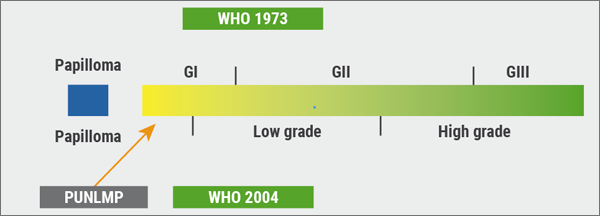https://doi.org/10.55788/a4b22dd9
Dr Alison Birtle (Rosemere Cancer Centre, UK) shared results from an updated analysis of the POUT trial (NCT01993979), a randomised, multi-centre, phase 3 trial assigning 260 post-nephroureterectomy patients with advanced UTUC either to surveillance only or to four 21-day cycles of adjuvant chemotherapy. For participants in the chemotherapy arm, treatment was initiated within 90 days post-surgery and consisted of either a combination of gemcitabine-cisplatin or, in patients with impaired renal function, gemcitabine-carboplatin. Follow-up visits to monitor for signs of recurrence occurred at the same frequency in both treatment arms; namely, at 4, 7, 10, and 13 weeks corresponding to the end of each chemotherapy treatment cycle. Patients underwent imaging and cystoscopy every 6 months for 2 years and then annually up to the 5-year point.
The primary endpoint was DFS within a 3-year time frame. The occurrence of 88 deaths triggered a (pre-planned) updated analysis with data cut-off 11 January 2021; after a median follow-up period of 49.2 months, 109 (41.9%) participants had reached the primary endpoint of DFS; 64/129 (49.6%) in the surveillance group and 45/131 (34.4%) in the chemotherapy group (adjusted HR 0.54; 95% CI 0.36–0.79; P=0.002). There had also occurred 93 deaths: 52 of the 129 patients in the surveillance arm (40.3%) and 41 of the 131 patients in the chemotherapy arm (31.3%) had died.
Secondary outcome measures included overall survival, metastasis-free survival, acute and late toxicity, and quality of life. All secondary outcome measures were tracked for 5 years except quality of life, which was only monitored for up to 2 years. Updated overall survival rates are 57% (95% CI 46–66) for patients under surveillance and 65% (95% CI 71–86) for patients receiving gemcitabine-cisplatin/carboplatin (adjusted HR=0.77; 95% CI 0.50–1.17; P=0.21). Metastasis-free survival was achieved by 66 of the 129 (51.2%) participants assigned to surveillance and by 45 of the 131 (34.4%) participants assigned to chemotherapy (adjusted HR=0.55; 95% CI 0.37–0.82; P=0.003). In the chemotherapy group, 44% of participants experienced grade ≥3 treatment-emergent adverse events (AEs) compared with only 4% of participants in the surveillance group [2]. These AEs were consistent with previous AEs reported for this chemotherapy protocol. The most common AEs experienced were hypertension (25/240, 10.4%), lethargy (25/240, 10.4%), urinary tract infection (14/240, 5.8%), and hearing loss (13/240, 5.4%). Chemotherapy was not associated with any long-term toxicity. Regarding quality-of-life outcomes, no differences were seen between the groups.
Despite a non-significant improvement in overall survival, the improved DFS and metastasis-free survival outcomes achieved by patients treated with platinum-based chemotherapy within 90 days post-nephroureterectomy have prompted the researchers to recommend this protocol be considered a new standard of care for these patients.
- Birtle AJ. Updated outcomes of POUT: A phase III randomized trial of peri-operative chemotherapy versus surveillance in upper tract urothelial cancer (UTUC). Abstract 455, ASCO Genitourinary Cancers Symposium, 11–13 February 2021.
- Birtle A et al. Lancet. 2020 Apr 18;395(10232):1268–77.
Copyright ©2021 Medicom Medical Publishers
Posted on
Previous Article
« Signature DNA alterations in subtypes of bladder cancer Next Article
Enfortumab vedotin as a promising treatment option for bladder cancer: phase 2 results »
« Signature DNA alterations in subtypes of bladder cancer Next Article
Enfortumab vedotin as a promising treatment option for bladder cancer: phase 2 results »
Table of Contents: ASCO GU 2021
Featured articles
Prostate Cancer
Lu177 as a promising new therapy for metastatic prostate cancer
Role of prostate cancer genomics is evolving
Apalutamide prolongs progression-free survival in prostate cancer
Dose-intensified radiation therapy fails to provide better outcomes in prostate cancer
Intrinsic tumour biology may be predictive of treatment response in prostate cancer
Final TITAN trial results favour use of apalutamide
Penile Cancer
Prognosis of penile cancer associated with HPV status
Renal Cancer
Superior clinical outcomes and QoL with nivolumab plus cabozantinib in RCC
Lenvatinib plus pembrolizumab prolongs survival in renal cell carcinoma
Inflammatory markers may guide treatment decisions in metastatic renal cell cancer
Clinical trial exclusion criteria may lead to lack of evidence in real-world patients: how do the excluded fare?
Axitinib offers hope for improving renal cell cancer surgical outcomes
Cabozantinib as possible new first-line therapy in translocation renal cell carcinoma
Predictors of oral anti-cancer agent utilisation in renal cell carcinoma
Denosumab plus pembrolizumab in advanced clear cell renal cell carcinoma
Testicular Cancer
New prediction model for brain metastasis in germ cell tumours
Reduction in radiation exposure is possible in testicular seminoma surveillance
New therapeutic option for early metastatic seminoma
Urothelial Cancer
Poorer outcomes in bladder cancer predicted by race/ethnicity and gender
Enfortumab vedotin as a promising treatment option for bladder cancer: phase 3 results
Enfortumab vedotin as a promising treatment option for bladder cancer: phase 2 results
New standard of care recommended for patients with upper tract urothelial cancer
Signature DNA alterations in subtypes of bladder cancer
ACE inhibitors associated with superior responses in bladder cancer
Better allocation of research dollars needed
Better prediction of favourable responses to immune checkpoint inhibitors in mUC
Genitourinary Oncology
Researchers call for an overhaul of licensing and funding of anti-cancer drugs
Exploring a new strategy for metastatic germ cell tumours
Related Articles

May 21, 2019
Bladder cancer risk and early detection
© 2024 Medicom Medical Publishers. All rights reserved. Terms and Conditions | Privacy Policy

